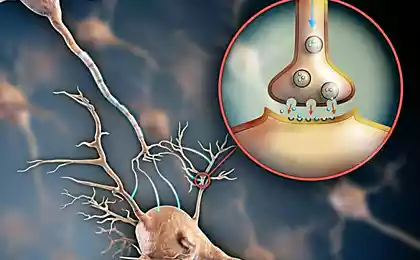602
The intestinal mucosa: 3 keys to recovery and rehabilitation
The reason for most of the diseases of the digestive system is itself the intestinal mucosa. We must remember that the absorption of the nutrients that we get from food, occurs during its passage through the small intestine and colon, this process is very complicated, but it is perfectly debugged.
What does it mean? The intestinal mucosa, its cells must be in perfect condition to send to our bloodstream as many nutrients as possible and hold toxins.
If it is inflamed, subject to any disease or is saturated with toxins in our blood get not the best material, as well as bacteria. Therefore it is very important that the intestinal mucosa was strong and healthy.
We invite you to learn three key elements of its recovery.

Intestinal hyperpermeability is the process by which our bodies get certain substances that have not been filtered out in the intestinal mucosa, and thus we can get sick.
When these harmful elements captures our immune system, it triggers an inflammatory response to begin to deal with the risk or threat of infection. If this process lasts long enough, we are talking about chronic inflammation.
What causes intestinal hyperpermeability?
Allergy or intolerance to certain products, such as milk.
Sometimes, we suffer from allergies at some beverages, vegetables, fish or even spices, and not even know it. We notice that we feel bad afterwards, however, still continue to eat them. Dairy products, for example, often cause such problems.
There are a variety of agricultural methods additives, preservatives, and food dyes, which damage our intestinal mucosa.
It is also interesting to know that many drugs are detrimental to our intestinal mucosa, and may even interfere with the normal absorption of nutrients.
Medications to protect the stomach, which are discharged together with painkillers, antibiotics or the effects of chemotherapy often leads to problems.
We must also not neglect the health of our intestinal flora. If our intestines are not settled by a sufficient amount of acidophilus bacteria that fight germs or fungus Candida, we can suffer from problems hyperpermeability of the intestinal mucosa.
Secrets of the intestinal mucosa regeneration
1. Increase the amount of digestive enzymes
None of us do not even think about your digestion until the problems start, and we do not feel discomfort, gas, inflammation or even symptoms of irritable bowel.
We must remember that the process of digestion begins at the very moment when we choose food which is then put in our mouth. In order to protect and strengthen our intestinal mucosa, it is necessary, firstly, to thereby allocate enough digestive enzymes.
Thanks to them, the digestion process will go much better and we will help the cells of the intestinal wall to select the needed nutrients, which can then get into our blood.
Pay attention to the foods that can help your body to allocate greater amounts of digestive enzymes:
Raw vegetables: celery, broccoli, parsley
Papaya is very suitable, for example, for people whose pancreas does not produce enough enzymes
Pineapple, ideal for reducing inflammation
Kiwi
Grapes
Honey
2. Clean the intestinal mucosa
Layer harmful bacteria that adhere to the intestinal mucosa and prevent us absorb nutrients adequately called "biofilm". How to solve this problem? You can help these tips:
Drink two liters of water a day
Start your morning with a cup of warm water with lemon juice
Eat fruits red, natural, with no added sugar
Drink infusions of parsley and dandelion
Eat whole grains that are rich in carbohydrates: brown rice, buckwheat, oats
Add flaxseed to your food, you can sprinkle them
food Eliminate sugar, dyes, sugary drinks and unhealthy fats
Daily practice any physical activity: walk, ride a bike, swim
3. Regenerate the intestinal mucosa
Add probiotics to your diet: yogurt is an excellent choice
. Add to your diet Prebiotics: they are a type of carbohydrate that our intestines can not digest, but they have the ability to selectively modify the intestinal flora to strengthen its
. You can find them in the following products:
bananas
asparagus
garlic
tomatoes
leeks
whole wheat
artichokes
onions
chicory
In conclusion, we repeat, to the intestinal mucosa was healthy, you should maintain a healthy lifestyle and eat right.
Thus, it is possible to summarize all of the above in the following paragraphs:
Before you put a product in your mouth, consider whether it is useful? Just imagine that all these delicious dishes, saturated fat, or any sweet drink bright colors turn inside you in toxins that tightly glued to the intestinal mucosa.
Take care of your bacterial flora by means of suitable probiotic and prebiotic products.
Monitor the use of drugs, do not take them, if they are, in fact, you do not need.
Avoid daily stress.
Keep an active lifestyle, take the time for a complex of aerobic exercise.
What does it mean? The intestinal mucosa, its cells must be in perfect condition to send to our bloodstream as many nutrients as possible and hold toxins.
If it is inflamed, subject to any disease or is saturated with toxins in our blood get not the best material, as well as bacteria. Therefore it is very important that the intestinal mucosa was strong and healthy.
We invite you to learn three key elements of its recovery.

Intestinal hyperpermeability is the process by which our bodies get certain substances that have not been filtered out in the intestinal mucosa, and thus we can get sick.
When these harmful elements captures our immune system, it triggers an inflammatory response to begin to deal with the risk or threat of infection. If this process lasts long enough, we are talking about chronic inflammation.
What causes intestinal hyperpermeability?
Allergy or intolerance to certain products, such as milk.
Sometimes, we suffer from allergies at some beverages, vegetables, fish or even spices, and not even know it. We notice that we feel bad afterwards, however, still continue to eat them. Dairy products, for example, often cause such problems.
There are a variety of agricultural methods additives, preservatives, and food dyes, which damage our intestinal mucosa.
It is also interesting to know that many drugs are detrimental to our intestinal mucosa, and may even interfere with the normal absorption of nutrients.
Medications to protect the stomach, which are discharged together with painkillers, antibiotics or the effects of chemotherapy often leads to problems.
We must also not neglect the health of our intestinal flora. If our intestines are not settled by a sufficient amount of acidophilus bacteria that fight germs or fungus Candida, we can suffer from problems hyperpermeability of the intestinal mucosa.
Secrets of the intestinal mucosa regeneration
1. Increase the amount of digestive enzymes
None of us do not even think about your digestion until the problems start, and we do not feel discomfort, gas, inflammation or even symptoms of irritable bowel.
We must remember that the process of digestion begins at the very moment when we choose food which is then put in our mouth. In order to protect and strengthen our intestinal mucosa, it is necessary, firstly, to thereby allocate enough digestive enzymes.
Thanks to them, the digestion process will go much better and we will help the cells of the intestinal wall to select the needed nutrients, which can then get into our blood.
Pay attention to the foods that can help your body to allocate greater amounts of digestive enzymes:
Raw vegetables: celery, broccoli, parsley
Papaya is very suitable, for example, for people whose pancreas does not produce enough enzymes
Pineapple, ideal for reducing inflammation
Kiwi
Grapes
Honey
2. Clean the intestinal mucosa
Layer harmful bacteria that adhere to the intestinal mucosa and prevent us absorb nutrients adequately called "biofilm". How to solve this problem? You can help these tips:
Drink two liters of water a day
Start your morning with a cup of warm water with lemon juice
Eat fruits red, natural, with no added sugar
Drink infusions of parsley and dandelion
Eat whole grains that are rich in carbohydrates: brown rice, buckwheat, oats
Add flaxseed to your food, you can sprinkle them
food Eliminate sugar, dyes, sugary drinks and unhealthy fats
Daily practice any physical activity: walk, ride a bike, swim
3. Regenerate the intestinal mucosa
Add probiotics to your diet: yogurt is an excellent choice
. Add to your diet Prebiotics: they are a type of carbohydrate that our intestines can not digest, but they have the ability to selectively modify the intestinal flora to strengthen its
. You can find them in the following products:
bananas
asparagus
garlic
tomatoes
leeks
whole wheat
artichokes
onions
chicory
In conclusion, we repeat, to the intestinal mucosa was healthy, you should maintain a healthy lifestyle and eat right.
Thus, it is possible to summarize all of the above in the following paragraphs:
Before you put a product in your mouth, consider whether it is useful? Just imagine that all these delicious dishes, saturated fat, or any sweet drink bright colors turn inside you in toxins that tightly glued to the intestinal mucosa.
Take care of your bacterial flora by means of suitable probiotic and prebiotic products.
Monitor the use of drugs, do not take them, if they are, in fact, you do not need.
Avoid daily stress.
Keep an active lifestyle, take the time for a complex of aerobic exercise.























